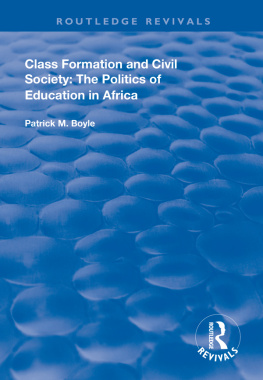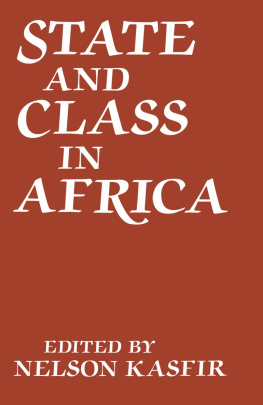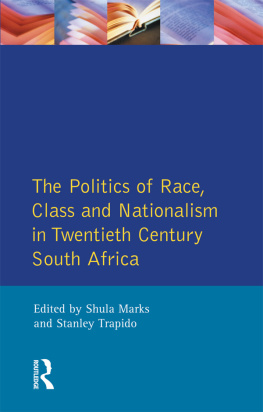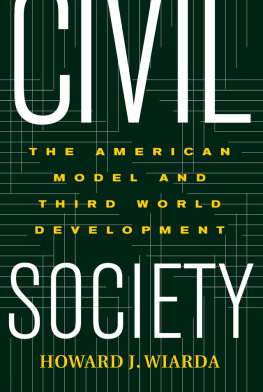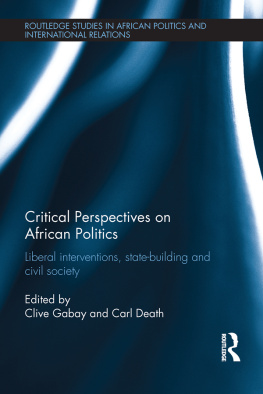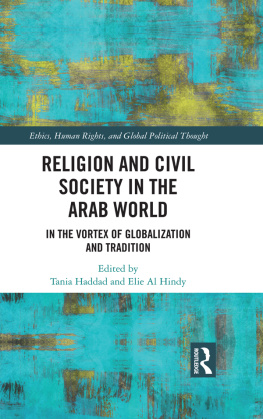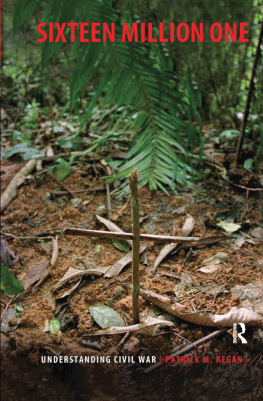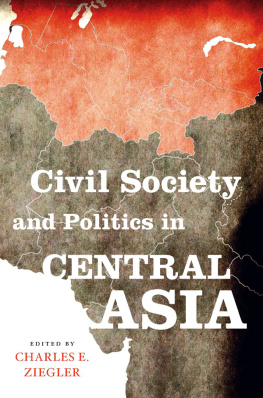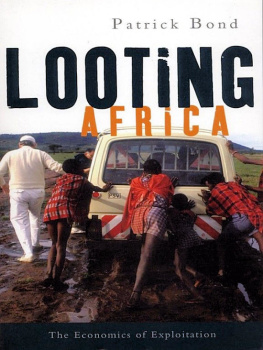Class Formation and Civil Society: The Politics of Education in Africa
The Making of Modern Africa
Series Editors: Abebe Zegeye and John Higginson
Contemporary Issues in Socio-economic Reform in Zambia
Edited by Herrick C. Mpuku and Ivan Zyuulu
The State and Organised Labour in Botswana
Monageng Mogalakwe
Small African Towns between Rural Networks and Urban Hierarchies
Poul Ove Pedersen
Regional Cooperation and Integration within Industry and Trade in Southern Africa
Jens Haarlov
From Self-Help Housing to Sustainable Settlement
John Tait
Ominous Transition
Joye Bowman
Contemporary Issues in Regional Development Policy
Edited by Wilbert Gooneratne and Robert Obudho
Religious Militancy and Self-Assertion
Toyin Falola and Matthew Hassan Kukah
An Aristocracy in Political Crisis
Alhaji Mahmood Yakubu
The Golden Contradiction: A Marxist Theory of Gold
Farouk Stemmet
Beyond the New Orthodoxy
Nikoi Kote-Nikoi
First published 1999 by Ashgate Publishing
Reissued 2018 by Routledge
2 Park Square, Milton Park, Abingdon, Oxon, OX14 4RN
711 Third Avenue, New York, NY 10017, USA
Routledge is an imprint of the Taylor & Francis Group, an informa business
Copyright Patrick M. Boyle 1999
All rights reserved. No part of this book may be reprinted or reproduced or utilised in any form or by any electronic, mechanical, or other means, now known or hereafter invented, including photocopying and recording, or in any information storage or retrieval system, without permission in writing from the publishers.
Notice:
Product or corporate names may be trademarks or registered trademarks, and are used only for identification and explanation without intent to infringe.
Publishers Note
The publisher has gone to great lengths to ensure the quality of this reprint but points out that some imperfections in the original copies may be apparent.
Disclaimer
The publisher has made every effort to trace copyright holders and welcomes correspondence from those they have been unable to contact.
A Library of Congress record exists under LC control number: 98074509
ISBN 13: 978-1-138-61767-4 (hbk)
ISBN 13: 978-0-429-46153-8 (ebk)
For a brief period during the second half of the twentieth century, Africans in most of the larger cities south of the Sahara enjoyed the likely prospect of access to six or more years of formal education and the benefits of functional literacy. The creation of state-wide systems of public sector education throughout the region, despite the challenge this presented for educators and the burden this represented for state budgets, stands as one of the principal developmental achievements of African societies in early post-independence Africa. The short-lived period of near universal access to formal schooling, between roughly 1975 and 1985, allowed an entire generation of Africans to move beyond the colonial legacy of an education reserved for elites and assisted their societies in consolidating a more advantageous position among emerging states in the developing world.
This book originated in a desire to explain why in the Congo (formerly Zaire) in the 1980s primary school enrollment rates began to fall precipitously after two decades of massive commitment of public moneys and human resources to build one of the continents largest public sector school systems. The experience of the Congo has turned out to be the most extreme case of a phenomenon that has arisen in many neighboring states. At one level, this study examines the politics of the rise of formal education in the region and explores the meaning of its current decline. But this study is also an exploration into the politics of Africa and the tools political scientists use to understand it. This study is an exploration into the relevance of class analysis in Africa and the possibility that civil society might demonstrate particular class characteristics. From the standpoint of political analysis such a topic may seem a departure from the most common topics of contemporary interest among political scientists whose focus is Africa: regime transitions, democratization, civil wars, and the politics of development. But the topic of the politics of education in Africa nonetheless enjoyed a period of intense scholarly examination during the 1960s and early 1970s. The arguments presented in this book suggest that the need for new studies in this area has returned.
When social scientists probed the politics of education during the early years of political independence, they attached particular importance to formal education as an important social service that was shaped by the colonial state and its agents and that was destined to help shape the state and society arising out of the processes of decolonization. The education sector thereby became an object of both intense effort and enthusiasm.
If some political scientists in the early years of the approach we now call modernization uncritically accepted the belief that formal education held the key to unlocking the door to Africas political and economic development, others scrutinized the view that education was the master determinant of economic growth and probed the relationship among education, political leadership, and economic development. In the 1950s British scholars like P.C. Lloyd initiated scholarly debates over the kind of modernity a highly educated African elite would bring to politics and society in an independent Africa. In the United States, James Coleman offered regional experts theoretical foundations for their studies of the ways in which education and development were interrelated processes. Ren Clinget and Philip Foster identified and discussed the striking advantages enjoyed in Africa by the lucky few who had access to educational resources.
Perhaps better than any of the other works produced during this period, David Abernethys groundbreaking discussion of politics and ethnicity in Nigeria brought this first phase of analysis of the politics of education in Africa to its highest level and completion. His presentation of the political dilemma of popular education demonstrated that the politics of education shifted not only under the pressures created by ethnic conflict, but also because the very policies designed to mitigate such conflicts created regional imbalances. The rapid spread of educational opportunity in Nigeria was discovered to have a dynamic all its own and held out not only the promise of political development but also of political decay. Nigerias singular experience with rapid educational expansion was an exception that proved the rule: rapid educational expansion changed the perception of privilege attached to lower levels of educational attainment and, in most cases, thereby diminished for at least two decades the salience of formal education as an issue for political conflict
Indeed, the swift spread of schools and opportunity throughout the continent changed the nature of the debate over education in Africa. By the late 1970s political scientists who delved into discussions of politics and education in Africa limited themselves to a select set of church-state battles over administrative control of school systems, occasional articles on the ineffective use of schools by authoritarian regimes for ideological formation, and endless litanies of complaints about the lack of quality in the newly created schools for the masses. Perhaps the school systems themselves were simply growing too quickly for careful analysis of their impact on society or state politics. As administrators in the Congo liked to write in their reports at the time, anarchy characterized school infrastructure expansion in the 1970s.

